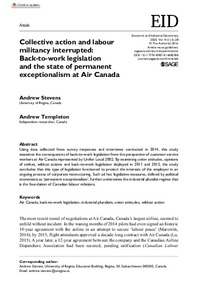Collective action and labour militancy interrupted: back-to-work legislation and the state of permanent exceptionalism at Air Canada

Stevens, Andrew ; Templeton, Andrew
Economic and Industrial Democracy
2020
41
1
February
6-28
return to work ; strike ; labour relations ; labour legislation ; airline ; trade union role ; survey
Labour relations
https://doi.org/10.1177/0143831X16682306
English
Bibliogr.
" Using data collected from survey responses and interviews conducted in 2014, this study examines the consequences of back-to-work legislation from the perspective of customer service workers at Air Canada represented by Unifor Local 2002. By examining union attitudes, opinions of strikes, wildcat actions and back-to-work legislation deployed in 2011 and 2012, the study concludes that this type of legislation functioned to protect the interests of the employer in an ongoing process of corporate restructuring. Such ad hoc legislative measures, defined by political economists as ‘permanent exceptionalism', further undermines the industrial pluralist regime that is the foundation of Canadian labour relations."
Digital
The ETUI is co-funded by the European Union. Views and opinions expressed are however those of the author(s) only and do not necessarily reflect those of the European Union or the ETUI.